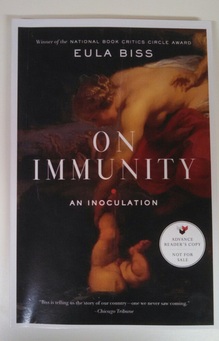 Dear Friend, When she was ten minutes old, the nurse took E. to a table across the delivery room and began squeezing goop into her eyes. “What’s that?” I asked. “It prevents infection,” the nurse said. I nodded knowingly--Infection is bad!--and took her word as truth. But I’ll tell you, Friend, it wasn’t pretty to watch—not the gooping of her eyes or the pinpricking that followed. She’d barely even opened those eyes and already, our welcome committee came bearing no fruit baskets, just pain following the pain she’d already endured. The hospital spared little time arming her against the infections of the world, leading me to wonder: If it’s so dangerous out here, why do we ever leave the womb? It’s an observation Biss tackles in her new book, On Immunity, noting that since the womb is “sterile, the act of birth itself is the “original inoculation.” Microbes latch on, creating the child’s “ecosystem.” But often that ecosystem needs help, which is why Biss argues passionately in favor of vaccinations, even if they aren’t always pretty. Of course, vaccinating children isn’t meant to be pretty; it’s meant to keep them safe—a small discomfort endured in the present to spare them a future plight. But this isn’t the view held by all, and the startling growth in the anti-vaccine movement seemed to have served as further impetus for Biss's rebuttal. And it’s a fine rebuttal— scientific and philosophical, historical and literary, too. She calls upon everyone from Achilles to Dracula to try to make sense of her own parental fears; fears quite rational in the modern world. For all our allegiance to antibacterial soaps and bug sprays and wall socket covers, Biss knows what we all know: “A child cannot be kept from his fate, though this does not stop the gods themselves from trying.” It hardly stops parents from trying either (see: antibacterial soap, bug spray, wall socket covers). And though our helplessness will always remain (not even Thetis could keep her son, Achilles, invulnerable), our parental transgression only occurs when the trying doesn’t. You know me, Friend, I'm quite the try-er. I’ll gladly rely on everything from wishing wells to four-leaf clovers if I think it might ensure the safety of my offspring. And even if it doesn’t, but it does no harm, I’ll probably rely on it anyway. Which is to say, I didn’t need Biss’s book to tell me to vaccinate my kid. Didn’t need her to chide me to suck it up and deal with the goop and the pinprick. Sure, this wasn’t the entrance into the world I wanted to give E., but it’s the exit I’m more concerned about. And there are so many exits, Friend, we could all some help in blocking the doors. Write soon Until then,
4 Comments
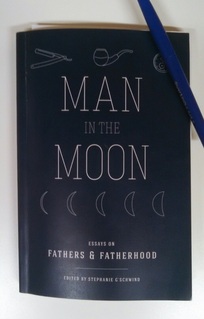 Dear Friend, Last night I spent the better part of an hour searching for Buzz Lightyear in the tall grass alongside the river. Against my advice, H. had lugged an unseeingly number of toys to the outdoor concert earlier that evening, and after we returned home, we unpacked the toys to find that Buzz was no longer among the others. Of course, this was hardly the first time a toy had gone missing, but given Buzz’s cinematic history, I didn’t want to miss my chance to watch Toy Story 4 play out before my eyes. And so, I drove back to that park—now empty aside from the bands of 20-year-olds passing bottles of Boone’s Farm—and did a full sweep of the area. I found no Buzz, just an expensive pair of sunglasses, which I left conspicuously on a nearby rock in case the former owner found herself sweeping the area later that night. But on my drive home—just as I began to think Toy Story 4 was going to be a real downer—I received a call from my wife informing me that a friend of ours had snagged him, that we could retrieve ol' Buzz the following day. Friend, I was no hero that night, but at least I tried to be. In Stephanie G’Schwind’s anthology, Man in the Moon, contributors offer their own versions of the failed heroics of fatherhood. Though on occasion, we’re left reading about failed fathers more generally. It so easy for fathers to fail, especially when children often begin their lives with such high opinions of them. Though as some essays prove, this isn’t always the case. One particular essay that stuck out is Carole Firstman’s “Liminal Scorpions,” which begins with the unforgettable line: “I recently found a scorpion on my father’s desk, which I have since stolen.” The essay goes on to recount Firstman’s efforts to pack up a few key belongings for her ailing father, who has taken a trip to Mexico and decided he’d like to die there. Firstman’s father is hardly likeable (case and point: he demanded his wife and newborn daughter live in an army tent in the backyard when her baby noises became “too much of a distraction for him”); nevertheless, Firstman—now grown—gives her father his due, dutifully jotting down his requests and sending the items. The scorpion comes into play because Firstman’s father was a specialist in arachnids, at one point amassing “at least a thousand jars…” Firstman describes both the cruelty of his collection, as well as the care with which he studied them. “By decomposing, they would have become part of the soil, thus contributing to the next cycle of life. But preserved, they inhabited a space somewhere between life and death.” Firstman’s depiction of her father serves as another form of preservation—for better or worse. Long story short, my inability to find Buzz will surely cost me Father Of the Year. Though in truth, any number of past transgressions might’ve already cost me the prize. But as all of the essays in G’Schwind’s anthology confirm, perfect fathers are rarely worth writing about. I like to think that relationships between parents and children thrive in these moments of folly. But having once served as the child in the relationship, I also know that folly can stunt the growth before allowing for the bloom. You’ll know all of this in a couple of weeks, dear Friend, when you become the father. Good luck. I'll send good vibes your way. Until then, 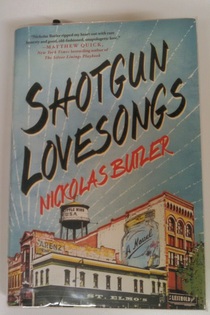 Dear Friend, I read this one in the delivery room, sitting couch-side while M. waited for the contractions to pick up. I’d promised myself I’d finish the book by the time her water broke (“Come hell or broken water!” I said with raised fist), which pleased M. just fine since it distracted me from a new comedy routine I’d been rehearsing entitled, “Ways to Amuse Your Wife When She’s In Labor.” (It mostly consisted of my making less-than-soothing ocean noises). I was within sight of the end when the midwife stepped into the room, saw me reclined and enjoying a book, and—quite surprisingly—refrained from bestowing me with the tongue-lashing I surely deserved. “Great book,” she said. “My husband’s listed in the acknowledgments.” He really is, Friend. I checked. Turns out he was Butler’s former teacher. Nick Butler, as you might guess, is a bit of a hometown hero around here, as he should be. His book recounts the interwoven story lines of four friends, all Wisconsinites, whose fame, dreams, and normalcy all plays a role in helping the book reach its crescendo. Equally exciting to we Eau Clairians, the book’s set right here in town, allowing us a unique familiarity not only with the place, but the kind of people (i.e. us) who inhabit such a place. Butler gets so many observations right (“Winter in Wisconsin is the ideal time to avoid someone because our garments grow ever larger…”) that it’s hard not to see ourselves reflected in every line. Rather, perhaps we recognize ourselves all too well. Simply put, we needn’t dig too deep to find things that connect us to the story, and in the case of my own delivery room reading, the connections were almost uncanny. As M.’s contractions began to quicken, I read the line, “When E. was born, I ruptured my uterus”—gasping at what I hoped wouldn’t turn out to be some kind of bibliomancy-induced prophecy. Not only had the book given us the delivery room scene, but the character's name was the same as our forthcoming child's. “What?” M. asked from her place on the bed. “Trust me,” I said, “you don’t want to know.” Long story short, no uteri were ruptured in the making of our child. All went smoothly enough. And as I held her for the first time a few minutes after her birth, lifting her to the hospital window so she could see the lake and the trees, I wondered which of the characters she might one day portray. We’re only on page one of her life, thank God, and I have no intention of rushing this story to its end. Until then, 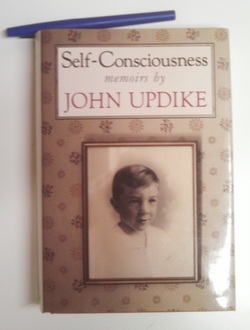 In November of 2001, back when I was a mere bookseller at the local bookstore, I was shelving in the U’s when I came across John Updike. It was a name I knew I knew, though I didn’t know why. I was 17, too naïve to know his prominence in the writing world; nevertheless, a sign directly above his books indicated that he would be reading in town the following week, and so, I decided to attend. The night of the reading, I listened intently as that old man with his shock of white hair read from Licks of Love, a book I’ve yet to read myself (much preferring the memory of Updike reading it to me). By reading’s end—even though I was floored by his talent—when I finally met the man face-to-face, all the 17-year-old me could muster were the regrettable words: “What was it like to be on The Simpsons?” As our hands clasped, it had suddenly occurred to me how I knew John Updike. He’d voiced himself in a recent episode, and as an avid watcher (and not yet an avid reader, regrettably), this had served as my introduction to the man. Long story short: Updike paused, mulled it over, and then remembered that yes, he had, in fact, been on The Simpsons, and that it was fine. A little context, Friend. I am no longer 17. In fact, I’m writing to you from the dining room table at 5:49a.m. on my 30th birthday. M.’s already one day past her due date, which means there’s at least some chance—if I’m lucky—I’ll be sharing my birthday cake for the rest of my life. Given these circumstances, I doubt it’ll surprise you to learn that when delving into Updike’s memoir Self-Consciousness earlier this week, I read it mostly for what might be gleaned from his attempts to balance family life alongside writing. Like this gem, describing his early years of fatherhood/writing: “In summer, though, what fullness of life, it seemed, to put in a few hours at the typewriter and then race downstairs…and leap into a station wagon or convertible containing my wife and a quartet of children, all of them plump and brown in their bathing suits!” It sounded like a good strategy to me: work followed by play. But what I’ve already learned—and likely what Updike learned—is that it’s far easier to break one’s work schedule than one’s play schedule, especially when the rest of your gang is honking the horn of the station wagon to hustle you out the door. And how can anyone in good conscious say no when loved ones try to liberate? How can one say, “Sorry perfect summer day (which I’ll never get again), and sorry family (which I'll also never get again), but I must further confine myself to a chair so that I can write feverishly and then delete most of what I write.” What kind of madness is that, Friend, and who would ever forgive such a trespass? Of course, Updike enumerates other perceived trespasses as well. In particular, he describes a revealing scene several years later—after his marriage had soured—when he learned that the dander from the family cats was the cause of his breathing problems. Updike writes that his wife “…saw, with me, that it was impossible to drown or give away Willy and Pansy, and that it was possible, at last that I go.” And so, John Updike left, beginning the irreversible splintering of his family. This is the outcome I’m trying to avoid, Friend, the one where the cats get priority. Given the choice, I’d much prefer leaping from the keys and hurling myself headlong into a waiting car en route to the beach. Would much prefer sand toys to ampersands, oceans to writing about oceans. When I feel pressure to write (and I often do), it’s always the result of the writer-in-me persuading the other-me than I’m writing for the family, that it's theirs, too. And I admit, dear Friend, that’s a lie I sometimes swallow. But then I remind myself: What good’s the writing without the subject? And what good are the words (even if they are good words) if written at such a high cost? In the final lines of Updike’s essay featuring the station wagon and the drive to the beach, the author mentions that he now lives (well, did live, may he rest in peace) within walking distance of a beach, and yet despite his proximity, he ventured there but three times a summer. He concludes: “Life suddenly seems too short to waste time lying in the sun.” As I sit at this dining room table at 6:29a.m., I'm just beginning to see flecks of sunlight dappling the trees. It's my cue to quit this letter. Write soon. Until then, 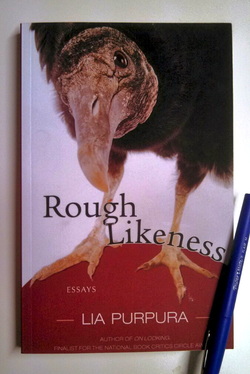 Dear Friend, I struggle to find the words to write to you about Lia Purpura’s essay collection, Rough Likeness. Probably, this is due to Purpura’s own finely tuned ear, which renders sentences with such clarity that any attempt by me to write of her writing seems only to add dissonance to her tune. And so, I suppose, let the pot-and-pan clamber begin. First, a summary of the collection: the collection defies summary. I swear to you, Friend, I am not being coy; I simply can’t boil Purpura’s work down into simple subjects. I am not alone. Even the back cover copy shies away from pinning down subjects, relying instead on a surplus of adjectives and verbs rather than the usual nouns. I can’t help but think these parts of speech clue us into what her essays are really “about”: not people, places, or things so much, but the experience of thinking deeply about all of them. Yes, Purpura is a thinker, and thus, her essays require thought. At times, I admit, I feel as if she’s trying to buck me through the tangential. She herself acknowledges her long-range leaps (“stay with me here”), though it's the challenge of staying with her that makes the reading experience a joy. When I read Purpura’s work, I find myself reading not only for the essay’s subject, but for the essay’s experiment as well. They are like two trapeze artists who always meet mid-air—tangling with such elegance that it’s all but impossible for me to see where one ends and the other begins. While I could say far more about her swoops in structure and subject, I can’t keep myself from writing love letters to the language itself. The way she handles words like baby birds—every last one cradled and stroked before inserted into its perfect place. But it’s not easy--not even for her. In “Augury,” Purpura dedicates several pages to unwinding the image of a bird snagged in a tangle of fishing line. Her unwinding takes time, and as she revises her language again and again, she leaves everything on the page so that we readers might know her struggle. “Then into the bower rained a bird,” she writes. “Dropped a bird. Now swings a bird. Hangs a bird.” The bird, now dead, no longer moves, though Purpura’s attempt to describe it keeps the image in motion. By reevaluating her language, she breathes life into a dead thing, helping us see the bird not for what it was, but for what it still is to her. I'm clambering again, and in an attempt to find focus, perhaps I’ll linger on “There Are Things Awry Here,” an essay in which Purpura tries to understand her visit to Tuscaloosa, Alabama—a visit I remember well. I was a grad student then, and though I (dumbly) didn’t enroll in her class, I served as a loyal loiterer during the week she spent in our town. As a result, I know the people she writes about in her essay. And I know the place. But I also know her confusion with the place, a land, as she notes, “Where stories won’t take…” Simply put, Tuscaloosa--like Purpura's collection--defies simple summary. And Purpura’s right in drawing attention to the complexities of the landscape. Yet rather than becoming stonewalled by the setting, she simply tried another tact. “When the land would not speak and my characters failed, when the land was muffled and my characters stock, this piece was born,” she writes. When I read the aforementioned lines, my mind immediately goes to a Charles D’Ambrosio quotation: “The problem with an essay can eventually become its subject.” Yes, Friend. This is it exactly. Every time I try to write an essay that matters to me, the essay puts up its fists. This battle wages on for some time. After awhile, I begin imagining us as two weary boxers bumbling about in the ring--starry-eyed, unhinged, and desperate to hold our ground. But after enough rounds, sometimes I surprise the essay by surprising myself and doing what Purpura did—ditching the battle plan and going off script, allowing the essay to lead. Pacifist that I am, I'm sure it doesn't surprise you to learn that I prefer my essays as dance partners rather than boxing opponents. But in truth, I'm not sure either metaphor aptly describes the relationship between essay and writer. After all, to an essay, the writer is neither a partner or an opponent--just the person on the other end of the high wire, reaching out in the hopes that someone might reach back. Okay, enough with my clambering. Take care Friend, and write soon. Until then, 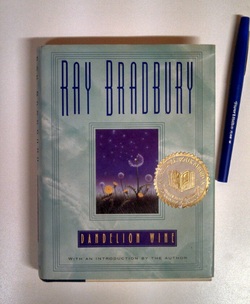 Dear Friend, I woke up at dawn this morning to assemble the lawn furniture; after a long winter, I was desperate to let summer begin. But as I learned, 6:00 a.m. is not the ideal time for much of anything, certainly not turning bolts and screws into place. That lawn furniture resisted my advances, played dumb as I tried to fit washer M into socket C. (Don’t even get me started with wing nut L.) The point is, it wasn’t easy, but it was necessary. It was time to make winter leave. And in my effort to welcome the new season, I knew I had to have that lawn furniture in place. Knew I had to sit upon it, too, when cracking the cover of Ray Bradbury’s Dandelion Wine, the book I’ve faithfully returned to at the start of every summer since the end of my seventh grade year. What can I tell you, Friend, but that the reading experience was wondrous—as it always is—and over much too fast. No matter how hard I tried to savor every page, I found myself gulping the words, exhibiting less-than a little restraint as I closed the book, breathless, three hours later. It was that quick, just like summer—there a moment and then gone. The book had started so promising, and then, like always, vanished. I sat on the lawn furniture—dumbfounded by the book’s speed—and realized that the furniture I’d assembled just that morning probably wouldn’t last long, either. All that hard work for nothing, I thought, for something that won’t last more than a season or two. It is this exact sense of ephemeralness that Dandelion Wine explores. When Leo Auffmann tries to invent his happiness machine, he learns, much to his horror, that the problem with inventing a happiness machine is that at some point, the user must re-enter the world, return to—as his wife puts it—“the dirty dishes and the beds not made.” She continues: “While you’re in that thing, sure, a sunset lasts forever,” but “[w]ho wants a sunset to last?” I like to think of life as an accumulation of sunsets, which of course, it is. But I also like to think that running parallel to these individual days is the longer narrative, one consisting of a single morning, a single noon, and a single sunset before the final night. Perhaps the reason I re-read this book year after year is because it reminds me of my own place along this journey. When I first read it, I was Douglas Spaulding. Then, as the years progressed, I grew into his father. One day—God willing—I will be Douglas’s grandfather, too. Interspersed throughout the book are the efforts by the Spaulding brothers—Douglas and Tom—to document their summer in full. With the help of a nickel tablet and a Ticonderoga pencil, they record every dandelion, every firecracker, every cicada and ice cream cone. But despite all their data collecting, summer still comes to its close, leaving them with nothing but their memories and a pencil-filled book. They could not keep their sunset, despite their best attempt. Which is not to say it was their only attempt. In the early pages of the book (in the early days of summer 1928), the Spaulding boys are commissioned by their grandfather to gather every dandelion in the yard, each of which will be used to press dandelion wine. The vintage is then left to ferment in the cellar, until a cold January day when at last it's released to melt the cold from their bones. In this way, dandelion wine serves as the book’s central metaphor, one that directly links with the lesson derived from Leo Auffmann’s happiness machine: that the things we cherish most are the things we know we’ll lose. Though I know better, each summer I, too, partake in an annual bottling of dandelion wine. Every August, I gather dandelions from the backyard, add a bit of rainwater, then screw tight the lid on a Mason jar and place it on the shelf. Today, I’ve got 20 years of summers on my bookshelf, though every last one has turned to sludge. It’s a visual reminder that I, too, cannot capture something meant to be fleeting. But it’s a reminder also that if we recognize that which we love early enough, we can love it twice as hard. This is not to say I love my lawn furniture. It's only to say I will love the time my family will spend on it. And when the day finally arrives when I have no choice but to walk those mildewed, bird-turded cushions to the curb, I’ll smile while doing it and remember today: when I got up at dawn to give us a little more time. Write soon. Until then, P.S. As I completed this letter to you, I dropped my beloved copy of Dandelion Wine on the kitchen floor. It cracked in half, dipped beneath its own horizon line. But it sure was beautiful while it lasted. 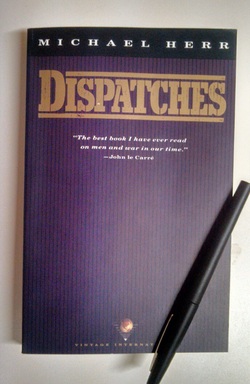 Dear Friend, I just spent the day with Michael Herr’s Dispatches, and let me tell you, I’m glad I don’t have to spend another. Not because the book was bad, but because it was terribly good—honest, true, and an intimate look at the Vietnam War that we somehow missed in high school history class. In fact, after finishing Herr’s book, I returned to my dusty, old textbook, cracked it for the first time in a decade, and marveled at how an entire war had been condensed into six or so pages. And none of those pages contained a single name of a single soldier: just politicians and death counts. Herr’s book is not about politicians or death counts; it’s about the casualties of war that kept on living. It’s a pastiche of soldier life told from the occasionally high, occasionally drunk reporter who embedded himself alongside them. Yet it's Herr’s close proximity to his subjects that creates such an unrelenting read. It’s the kind of book you absorb with your mouth hanging wide, wondering how it could ever be true. But beyond the individual anecdotes (can stories this cruel be called “anecdotes?”) lie the seeds of philosophical inquiry. We can’t help but ask the big questions when reading about soldiers who gobbled drugs to keep from asking them themselves. I can't say I blame them. What good were the “big questions,” after all, for men who were trained not to question? Momentarily inhabiting the mindsets of the soldiers, Herr comments on these questions: “No fair was no good,” he writes, “Why me? The saddest question in the world.” For Herr, finding causality in the chaos was a fool’s errand. He writes: “You could make all the ritual moves, carry your lucky piece, wear your magic jungle hat, kiss your thumb knuckle smooth as stones under running water, the Inscrutable Immutable was still out there…” Translation: their deaths were always awaiting them, regardless of who they appeased with what. While war movies often depict the victors collecting relics from their dead, I’d never considered the motivation of the action. Yet Herr reveals it, describing the act as “a little transfer of power…” It’s chilling, Friend, don’t you think? How easily a victim can be transformed into a talisman, something to be collected in the hopes of protecting the one who did the killing. Most of what I know of war I’ve learned from my grandfather, who—like so many veterans—preferred not to speak of it during his lifetime. He left no war talismans behind, just an audiotape, one I’ve listened to again and again in an attempt to understand the part of him I never knew. Growing up, sometimes I’d stare at that wobbly-kneed man and wonder How was he ever a soldier? I was young, and still lacked the imagination to understand that beneath his current exterior was an earlier version, and beneath that one, another. Yet even on the tape, my grandfather seemed to spare listeners the worst of it. The way he spoke of war, you’d think it was all guarding bridges and stirring to the sound of young French girls singing the soldiers awake. There are only a few minutes on that 60 minute reel in which he delves into the darkness, briefly touching on the time he killed the German soldier (who happened to already be dead), and the time he remained on high alert as enemy soldiers crept closer and closer throughout the night. The second story is my favorite, the one in which my grandfather—just a boy then—clutched his gun tight as a thump, thump sound startled him every half an hour or so, making sleep impossible. He remained on a hair-trigger throughout the night, only to learn at sun-up that the sounds were not coming from “enemy soldiers” but from some nearby apple trees that happened to be shedding their fruit. He called it "The War of the Apple Trees," and dedicated so much time to the tale it made me wonder if fighting apples was the most action he ever saw. But as I later learned, he fought many battles beyond the apple trees, even earning himself a few medals in the process. One day when he picked me up from kindergarten, I noticed a Purple Heart emblem affixed to his license plate. “What’s it mean?” I asked him. I wish I could remember what he said. All I know is that he survived when others didn’t, and that it probably wasn’t fair. Why him? Why was he so lucky? And why was I so lucky as to have benefited as a result of his luck? Lucky enough to be here today, writing to you, because the universe saw fit to spare him. Take care, Friend. Keep those talismans close. Until then, 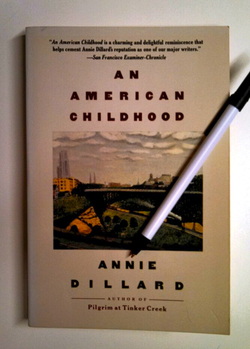 Dear Friend, How often have you stumbled upon the perfect book at just the perfect time? And how often have you wondered whether the call numbers were more than call numbers, but coordinates, perhaps, meant to ensure that that particular book eventually found its way to you? Annie Dillard’s An American Childhood—like all the books I’ve read recently—was not sought out as much as discovered. I came upon it at a library book sale, my arms doubling as divination rods as I slipped it into the sack. I needed it Friend, I really did. Lately, I’ve been feeling tired and old and removed from my own long-forgotten childhood. Which is why when the book came to me I knew to accept it, knew to treat it as a gift from the universe. Midway through the book, I find that Dillard, too, believe in this synchronicity between literature and life. “Books wandered in and out of my hands,” she writes, and I could barely even finish reading the sentence without thinking: Yes, books do wander, don’t they? Though they never wander aimlessly. Back in middle school—in the days of checkout cards—half the fun of finding a library book was finding out who read it before you. The checkout card had the power to trace the book’s history, each name above your own serving as an unsolicited recommendation. That checkout card allowed me to imagine all the places that book had ever been, allowed me to see its movement from backpack to nightstand to its safe return in the library drop box. And being able to trace the book’s journey always made me feel closer to the words within, made me better understand just how far it had travelled to find its way to me. Perhaps I’m making too much of this, Friend, but you know me, I’ve always been a sucker for signs from the universe. Regardless of whether those signs came in the form of names on a checkout card or “she-loves-me, she-loves-me-not” twists of apple stems, always, I do what I think the universe demands. “Everywhere, things snagged me,” Dillard writes, and again, I think: Yes, it is so easy to get snagged! But in a good way, of course, and in a way that makes me think there are few accidents in this world. I’m sheepish to admit how often I’ve relied upon a coin flip to make my decisions for me, how often I’ve entrusted my life to Fortune Cookies. But there’s something refreshing about making a decision not based solely on facts and figures, but feelings and instincts, too. I like to think these so-called “signs of the universe” are simply the reward we receive for noticing. For taking a moment to try to understand the world beyond our inner lives. This noticing was easier during my own childhood, back when my head wasn’t so clouded by all the usual worries. Back when a summer day started at dawn and stretched till dusk, and most of it was spent outdoors. There was always a fort to be built, always some hole to be dug, and through it all, I would search for signs. The daddy long legs consistently pointed me to the edible berries, while the squirrels—God bless their bushy tails—always steered my shovel clear of the underground electric lines. It was easy to interpret these signs because I was six or seven or eight or nine, and every last thing in the world possessed a life spark. Even the dead things—grass clippings, a rotted limb—always seemed vibrant to me. I wanted to see it all, believing that if I could just stop to notice the world then maybe the world would stop to notice me, too. As a young girl Dillard, too, was a noticer. “How much noticing could I permit myself without driving myself round the bend?” she asks. “Too much noticing and I was too self-conscious to live…Too little noticing, though…and I would miss the whole show.” We’re always aiming for that sweet spot, aren’t we, Friend? That spot where we remember we’re alive while forgetting we won’t always be. Okay, enough with all this. It’s time to get back to noticing. There are squirrels at the bird-feeder, after all, and I think they’re trying to tell me something. Write soon. Until then, 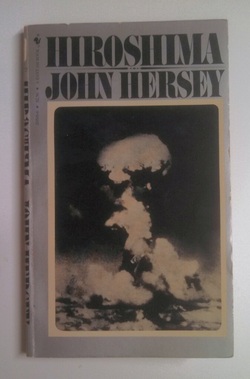 Dear Friend, This morning, as I wrapped up John Hersey’s Hiroshima, H. walked into my office, plucked my copy from my hands, and positioned himself on the rocking chair. “What’s that?” he asked, pointing to the cover. “That,” I said, “is an atomic bomb.” He considered this, studying the mushroom cloud before him, and at last concluded, “Oh, okay,” before abandoning the book for his toys. And that’s the story of how one little boy learned about another Little Boy. I admit, I’m always rather shocked, Friend, by the innocuousness of that bomb’s name. As if some PR man deep in the bowels of the Truman administration decided a name like “Little Boy” might soften the blow stateside. Might bolster Americans’ patriotic fervor by reminding us of what we were fighting for--Our little boys! Our little girls!—and help us forget the other boys and girls others fought for far away. After H. left the room, I found myself rereading the book from the start. Though this time, I focused on Hersey’s depiction of Hiroshima’s children, on the kids who—with the exception of time and place—were not unlike H. himself. Yes, my own son was born 68-years later and 6307 miles away, but that was all the distance between them. He just happened to be born on the right side of the bomb, by which I mean long after it had dropped. After wrapping up the book for a second time, I was disheartened to find children scattered throughout its pages. Like the story of Mrs. Kamai, just 20 at the time, who held tight to her dead infant daughter for four full days in the hopes her husband might return to say goodbye. And the story of the two young girls found shoulder-deep in the river, their bodies badly burned and absorbing salt water. There are so many other stories—of children who misplaced their mothers on their walks to theirs parks, and mothers who misplaced their children as well. Though of course, nobody “misplaced” anyone; a bomb displaced them all. Still, the result was mostly the same: generations peeled away from one another, everything turned to radiation and dust. In one particularly troubling passage, Hersey describes the experiences of the children of the Nakamura family who, “in spite of being very sick, were interested in everything that happened.” Not only were they interested, Hersey explains, but they were “delighted when one of the city’s gas-storage tanks went up in a tremendous burst of flame.” Once more, I am left thinking about scale, about perspective, and about what a bomb means to a boy 68 years removed from the bomb itself. For H., the cover photo of the mushroom cloud was not a bomb, but the cover of a book. It didn’t matter what that book was about. For him, a book was a book, not a bomb, and books--he knew--never harmed anyone. Generally. But how might one diffuse a book if one had to? If the material was simply too painful to read? I admit it: Hersey’s book is indeed painful to read, but I wouldn’t want to diffuse it. By book’s end, I figure I’m left hurting the way Hersey wants me to hurt—not by drama or sensationalized writing, but a weapon far crueler: factual reporting on the lives of those who were spared. Of course, when it comes to Hiroshima, I’m not sure anyone was spared. Some people simply survived. Next time, Friend, I swear to you I’ll read something lighter. How could I not after this? Until then, 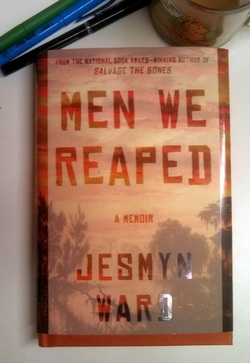 Dear Friend, Having just completed Jesmyn Ward’s Men We Reaped, I am again left thinking about Michael Donald. Not that it takes much to get me there. Michael, who I wrote about throughout Thirteen Loops, is someone I think about often. And not merely his violent death at the hands of a pair of Klansmen, but his life, too, or what I could cobble together about his life with the resources at my disposal. But that was always the problem with my book: no matter who I talked to, or what I read, I could never fully piece together the story of Michael’s life. I learned he was a good son, a fine brother, and a loyal friend, but that was about all I learned. The tragedy beyond the obvious tragedy of Michael Donald’s death is that I was unable to do justice to his life story. Reams of paper have been dedicated to his murder, but his life, at least for me, remains a mystery. Jesmyn Ward does a better job. In her book—which profiles the lives and deaths of five young African-American men she knew personally—Ward's focus remains on their lives. Her personal connections to the victims allowed her to get close in a way I couldn’t, thereby ensuring that the men she writes about are more than mere mysteries. Yet taken together, these men’s deaths speak to another mystery, one not even Ward can get to the bottom of: “…I wonder at our neighborhood’s silence,” Ward writes early on. “I wonder why silence is the sound of our subsumed rage, our accumulated grief.” She claims to have written the book to “give voice” to their stories, a rationalization I know well. I, too, have often told skeptical audiences that I—the white guy standing before them—wrote a book about racial violence in order to ensure that the stories of the past are not forgotten. It’s my way, I often prattle, of allowing the present to learn from the past. At the very least, it’s an explanation that helps me sleep at night. But before I get too self-righteous, I should probably state the obvious: writing about a young man’s murder probably helped my career. It didn’t make me rich or famous, but the book became a line on my CV. A young man was murdered in Mobile, and I added a line on my CV. My intention wasn’t to add a line—it was to write a book—and yet my intention and the outcome only partially synced. And who can know the full effect of that line? Perhaps it persuaded someone to grant me a job interview, and perhaps that job interview led to a job, which led to health insurance, and a pay check, and all because in 1981 a young man was murdered in Mobile. Or rather, because a young man was murdered in Mobile and then I wrote about his death. Not his life, mind you. His death. I tried to do the former, but I was not a skilled enough writer, and the few facts I had often slipped between my fingers. Ward never lets facts slip, mainly because the facts often come from her own life. When she writes of her brother’s death—a car crash involving an inebriated white man—she describes the story in full, one far larger than a momentary intersection of lives. Though her brother tried slamming on the brakes, Ward writes that there was “so much momentum, so many bodies and cars and histories and pressures moving all at once, that my brother could not stop his car.” I’ve read that line several times, and the word that always sticks out is “histories.” There were so many histories. So many stories tied to the story of her brother’s death. So many linkages, so many vantage points, so many ways to take hold of the thread of a single interaction and weave it into the fabric of a long line of racial injustices. No, I didn’t get drunk and behind the wheel, but I did take another risk. I was a grad student when I began the project, and while sitting on the steps of the University of Alabama’s Gorgas Library, I asked myself, Do you want to be the guy who tells the story or the guy who muffles it by not telling it? As you know better than anyone, Friend, I’m no victim and I’m certainly no hero. I’m just the guy who, every time he opens Ward’s book, is reminded of what he wanted to write. Write soon. Until then, |
AuthorB.J. Hollars is a writer and a teacher. Archives
June 2014
Categories |
 RSS Feed
RSS Feed